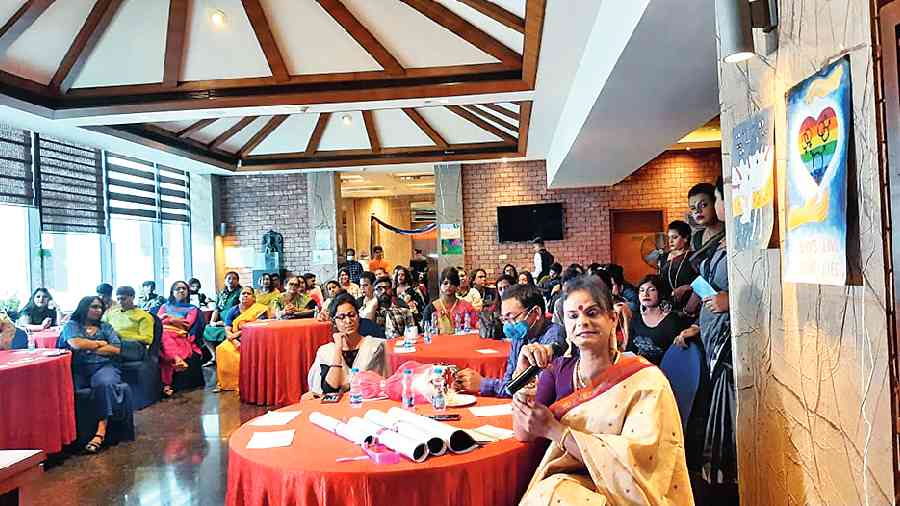One would not get a ready passport without shelling out a fat bribe. Another faced discrimination even in a doctor’s chamber. A third was harassed by a traffic cop in daylight.
Many stories of discriminations faced by transgenders came to the fore at a conference at a city hotel on Monday.
In front of senior police and health officers and activists, members of the community narrated how they faced discrimination everywhere — at local markets, public transports and shopping malls.
Three short films were shown at the start of the programme. In one of the films, Arindam Sarkar, a transgender dancer, said the discrimination was compartmentalised.
Growing up, Sarkar liked playing “ranna bati (cooking game)” but was forced to play cricket and football. At social gatherings, catcalls were a regular affair.
Things have hardly changed now, Sarkar said.
At a busy north Kolkata crossing, Sarkar was travelling in an auto with a pet dog. The driver was stopped by a traffic policeman for “flouting” a traffic light. The driver contested the allegation.
“When I tried to intervene, the officer asked for my identity. I said I was a transgender. The policeman then asked for proof and asked me to remove my clothes,” Sarkar says in the film.
Another transgender said she was harassed by passport officials. “They demanded Rs 5,000 extra to issue the document because they said I was a special case,” said the transgender.
In 2014, the Supreme Court ruled that transgender persons had the right to self-identify one’s gender as male, female or third gender and that the constitutional rights to life, dignity and autonomy would include the right to one’s gender identity and sexual orientation.
Subsequently, in December 2019, the government brought in the Transgender Persons (Protection of Rights) Act 2019, for which the rules were notified in September 2020.
The rules have provided mechanisms for ensuring non-discrimination of transgender persons in public life, such as setting up a transgender protection cell under the charge of the district magistrate.
The rules also indicate the government must provide infrastructure such as separate wards in hospitals, washrooms in establishments, temporary shelters and short-stay homes within two years from the coming into force of the rules.
All establishments, including the private sector, will also have to incorporate infrastructure adjustments, recruitment, employment benefits and promotion for transgender persons, and publish their equal opportunity policy.
The on-ground change has been little, though the emergence of several NGOs and collectives of transgenders have given voice to some issues.
In March 2021, in the run-up to the high-voltage West Bengal election campaign, this newspaper had reported of an interaction between CPM candidates and members of the lesbian, gay, bisexual, transgender, queer, intersex, asexual (LGBTQIA) community.
The members had given a scathing opinion of how they felt “left out” of the electoral and political process.
On Monday, Piyali Ghosh, a clinical psychologist who works with transgenders, spoke of the discrimination at healthcare centres.
“There has been a gradual improvement in their conditions, mainly because of increased awareness. But a lot still needs to be done. Access to basic healthcare is still not easy for many members of the community,” she said.
Priyabrata Roy, the deputy commissioner of the eastern suburban division, attended the programme. He acknowledged the need to sensitise people, even in the police force.
“We are working on this. The government cannot discriminate between its people. Everybody should be treated equally, said Roy.
A helpline for transgenders was also launched on Monday. It has two numbers — 8334844995 and 8334844996.
The programme was organised by the Centre for Health and Social Justice, which works to promote meaningful change in the lives of the marginalised communities, and Kolkata Rista, a transgender collective.
“The event attempted the creation an ecosystem of support for the transgender community through initiating a close liaison with multiple stakeholders,” said Jashodhara Dasgupta, one of the organisers.
